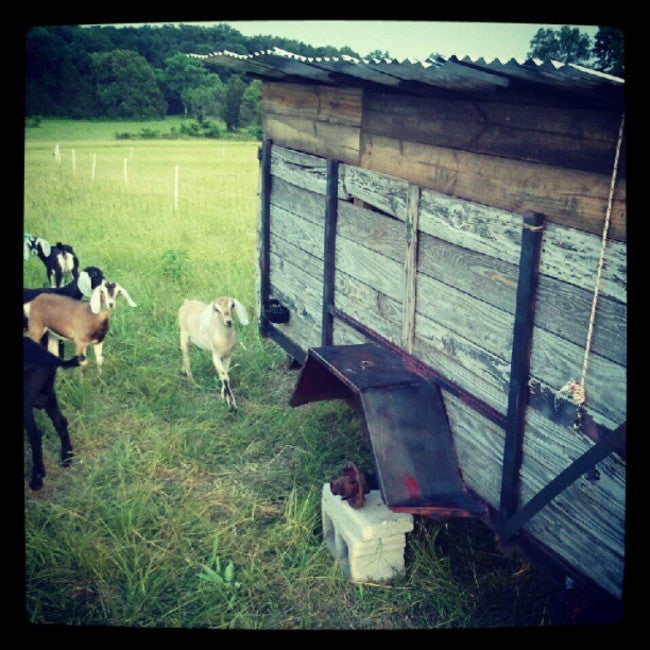
 Towing the Guinea Mobile out to pasture. It dual purposes as a shelter and shade shack for goats and guard dogs
Towing the Guinea Mobile out to pasture. It dual purposes as a shelter and shade shack for goats and guard dogs
Most of our readers are probably familiar with egg mobiles. Egg mobiles are the glorified apparatuses used by famed alternative farmer Joel Salatin and many other small-scale farmers to produce eggs from chickens out on pasture. The idea is simple: A mobile chicken coop is moved around with ruminant animals (typically cows) in order to clean up the pasture (dig through cow patties) and provide a free-range habitat for chickens to express their chicken-ness (eat lots of bugs and bathe in the dirt).
We love the idea of egg mobiles. Birds out on pasture living a natural life, not crammed three to a cage, forced to produce eggs under artificial light. Egg mobiles fit with our vision for Little Seed and one day we may actually have a real egg mobile. For now though, we have a Guinea Mobile.
In a standard egg mobile you have many "laying" chickens. These are chickens that aren't raised for meat, they are raised for egg production. With laying chickens come eggs. In order to keep the chickens alive and produce eggs you have to feed them. Once you have the eggs you need to store them, eat them, sell them and/or feed them to other animals (i.e. the pigs or dogs). For us, egg production just doesn't fit into the plans right now. Eggs are extraordinarily low margin (typically negative margin, or a loss-leader) and they require a lot of labor. Since we don't have any higher margin products (cheese or grassfed beef) to sell in tandem it really doesn't make sense to have a loss-leader product. The loss is supposed to lead the customers to products where you will make a profit. A profit is required if you want to stay in business. In our case, an egg mobile would just lead us to losing money. But we still want birds out on the pasture eating all the bugs and digging through the goat and cow manure. Reduced pests, flies and parasites, as well as high nitrogen poultry manure is a good thing. So we needed a solution where we wouldn't have to worry about overwhelming egg production and where we wouldn't have to feed very much.
 Damn Guinea Mobile got a flat before the guineas were even in it
Damn Guinea Mobile got a flat before the guineas were even in it
The answer is guineas. Guineas will put a bigger dent in the tick population than chickens would, they'll happily grub on grubs, and they'll hopefully enjoy their new pasture and be cooperative (i.e. not fly away and live in the wild). They are also better foragers and consume far less, if any, feed. Thus far our guineas around the house, aka the G-Unit, have worked out fantastically. They virtually eliminated the tick population (unless you decide to stand in a leaf pile) and they always come back to the coop to roost. We even get some eggs every now them, which are quite delicious. Their leader, Guinea-Cent, is a natural hawk spotter and rounds up the team whenever danger presents itself.
So we ordered some baby guineas and constructed The Guinea Mobile. About 6 weeks ago 30 day-old guineas arrived in the mail from a hatchery. Baby guineas are called 'keets'.The hatchery shipped the keets to us overnight (bizarre, right?) and we picked them up at the post office in a small box with small holes in it. Since then the guineas have grown strong with our daily feedings of garden "weeds" and poultry feed. They are now ready to enter the Guinea Mobile, where they will be confined for a week or two to acclimate them to their new home. After that they will be free to roam during the days and locked up in the mobile coop at night.
 Trap door for guinea entry and exit
Trap door for guinea entry and exit
More to come on the guinea mobile as their adventure progresses. We really hope it works out, this is something we've been looking forward to for a long time. Go guineas go.


